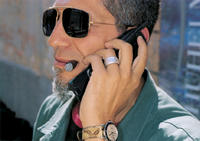 Geoff Dyer's Out of Sheer Rage presents itself as the account of a failed attempt to write a book about D. H. Lawrence. Or rather, it is a failed attempt to write a "sober, academic study of D. H. Lawrence" (1) because, ultimately, Dyer's book does still claim to be about Lawrence, if obliquely--or perhaps not obliquely enough.
Geoff Dyer's Out of Sheer Rage presents itself as the account of a failed attempt to write a book about D. H. Lawrence. Or rather, it is a failed attempt to write a "sober, academic study of D. H. Lawrence" (1) because, ultimately, Dyer's book does still claim to be about Lawrence, if obliquely--or perhaps not obliquely enough.The book is only obliquely about Lawrence in that so much of the narrative concerns the ways in which Dyer manages to procrastinate over his self-assigned task, often quite hilariously so. For instance, instead of reading about Lawrence he finds himself reading about Rilke, who himself wasted time agonizing about Rodin's words about the necessity of work:
I should have been working on my study of D. H. Lawrence and instead I was idling over Rodin's words. Il faut travailler, rien que travailler. I should be writing my book about D. H. Lawrence, I said to myself, everything else should be subordinate to that--but who can tell where that task begins and ends? Some huge benefit may yet accrue from reading Rilke's letters. The more I read, in fact, the more convinced I became that a better understanding of Rilke was crucial to an understanding of Lawrence. (20)And yet Dyer's book is rather more directly about Lawrence than the standard academic monograph, in that Dyer is concerned less with reading secondary literature on Lawrence ("the vast majority, the overwhelming majority of books by academics," Dyer tells us, "are a crime against literature" [102]) than with going where Lawrence went and, as far as possible, experiencing what Lawrence himself experienced.
In short, Out of Sheer Rage is a sort of gonzo literary criticism; he himself terms it "method" criticism (128). Rather than read Lawrence (because although Dyer does seem to have read plenty of Lawrence, he tells us precious little of that reading), the aim is to track Lawrence's own apparently aimless wanderings from Derbyshire, across the Mediterranean, and on to Mexico and the Southwest USA, and so to feel something of what Lawrence himself may have felt in those same places. Rather than interpretation, Dyer gives us affect.
This affective approach to Lawrence may seem to be peculiarly appropriate, given that this is a writer whose work is after all often concerned with intensity, spirit, and feeling, except that the prevailing affect in Dyer's traipse in Lawrence's tracks turns out to be lassitude, frustration, and boredom. If academic criticism is from the start ridiculed (perhaps particularly for a subject such as Lawrence) as spectacularly missing the point, the attempt at affective encounter would likewise appear, at least as Dyer presents it, to be inevitably doomed. For instance, when he finally reaches the site of Lawrence's house in Taormina, Dyer first finds roadworks and "a Moscow smell of petrol" and then, seeing a plaque verifying that this is indeed the place, comments:
We had found it. We stood silently. I knew this moment well from previous literary pilgrimages: you look and look and try to summon up feelings that don't exist. You try saying a mantra to yourself, "D. H. Lawrence lived here." You say, "I am standing in the place he stood, seeing the things he saw...", but nothing changes, everything remains exactly the same: a road, a house with sky above it and the sea glinting in the distance. (60)New Mexico is similarly disappointing: Santa Fe "didn't quite live up to the immense romance of the name" (213-4) while Taos's one distinguishing feature ends up being the fact that it has "an unrivalled concentration of terrible artists" (216).
If this book is born "out of sheer rage" (the quotation comes from Lawrence himself, writing a book on Thomas Hardy that "will be about anything but Thomas Hardy I am afraid"), perhaps that is because it effects a transmutation of Lawrentian rage ("Lawrence was angry even in his sleep," we are told [160]) to what we might call a characteristically Dyersian minor irritation and petty annoyance. Dyer shows his talent for petty annoyance particularly in his relations with his girlfriend, who accompanies him on much of his journey and with whom he frequently squabbles. He himself, near the end, concludes that his own book is ultimately about despair, but really it's a peculiarly affectless despair, a depression that he defines as "the complete absence of any interest in anything" (227).
But in a final twist of a book that is full of the kinds of twists and turns that constitute uncertainty, general unease, and restlessness rather than high drama, the pursuit of Lawrence, however dissatisfying and even trivial ("Could such a simple quest really have required such a disproportionate investment of effort?" Dyer askes [226]) turns out to be therapeutic. The voyage itself at least staves off the utter meaningless and depression that otherwise, it's suggested, awaits us. We all need some vague sense or irritation, we're told, that keeps us in a kind of Brownian motion that attempts to salve minor dissatisfactions:
Our lives are actually made up of lots of tiny searches for things like a CD we are not sick of, an out-of-print edition of Phoenix, a picture of Lawrence that I saw when I was seventeen, another identical pair of suede shoes to the ones I am wearing now [. . .]. Add them together and these little things make up an epic quest, more than enough for one lifetime. (230-1)Hence it is that "One way or another we all have to write our studies of D. H. Lawrence" (231) and "the best we can do is to try to make some progress with our studies of D. H. Lawrence" (232).
And yet, perhaps appropriately, I find this conclusion disappointing. Dyer would say "But of course!" The apparent profundity, however, is plucked out of nowhere. And the fact that a book that is rather interesting on what we might call an affect of disinterest and fragmentation, of never being able to resolve the elements of what we imagine must once have been a coherent whole, ends up as a form of consolatory self-help in renaming these petty parts an "epic quest"--indeed, ends up taking a sort of smug satisfaction in dissatisfaction--well, I find it mildly annoying.







